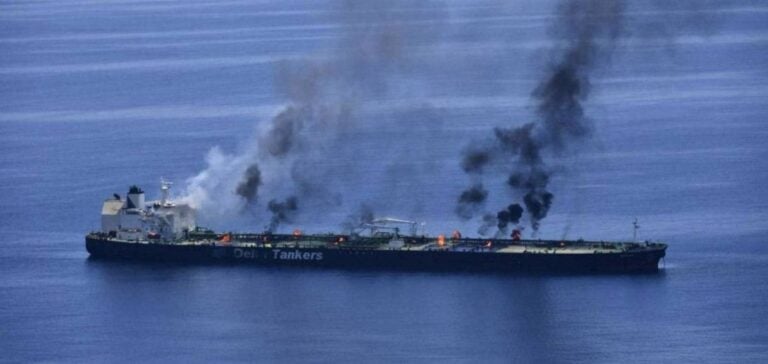The towing of an oil tanker in trouble in the Red Sea is attracting attention because of the potential implications for the environment and maritime safety.
The vessel, MV Sounion, was attacked by Houthi rebels in August, resulting in a fire and the loss of motive power.
Carrying over a million barrels of crude oil, the tanker represents a significant risk of an oil spill, comparable to that of the Exxon Valdez in 1989.
Towing operations, which are taking place under the supervision of theEuropean Union‘s naval mission, are complex and require careful coordination between several players.
Greek military authorities report that the tow is progressing slowly, with notable interruptions.
According to a military source, the vessel is currently headed north, but the final destination has not been specified.
Experts point out that if the tanker were to break up or explode, the consequences would be catastrophic for the marine ecosystem.
“When it reaches a safe mooring, attempts will be made to extinguish the fire and measures will be taken to prevent the cargo from leaking,” said a Greek military official.
This situation highlights the challenges of maritime safety in an already unstable region.
Maritime safety issues
The MV Sounion, carrying 150,000 tons of crude oil, was attacked while anchored near the Houthi-controlled port city of Hodeida.
The attack was followed by the evacuation of the crew by a French frigate, underlining the need for rapid intervention in maritime emergencies.
The Houthis, who have stepped up their attacks on ships they consider to be linked to Western powers, also claimed responsibility for the explosion of charges on the ship’s deck, aggravating the situation.
The European Union naval mission deployed in the region is playing a crucial role in managing this crisis.
It has stated that the rescue of the MV Sounion is a complex operation taking place in several phases.
Aerial images published by the mission show the tanker still emitting smoke, indicating that the fire is not yet under control.
The towing operation is supported by frigates, helicopters and special forces teams, although the nationality of the latter remains undisclosed.
Geopolitical and economic implications
Houthi attacks on ships in the Red Sea are having an impact on global trade, disrupting maritime traffic in a strategic area.
The United States has responded by forming an international maritime coalition to protect waterways, and by carrying out strikes against rebel targets in Yemen.
This escalation of tensions underlines the importance of maritime security in the context of regional conflicts and global economic interests.
The implications of this situation go beyond mere maritime security.
Tensions between the Houthis and Western powers, notably the United States and the United Kingdom, exacerbate conflicts in the region.
Attacks are often justified by the Houthis as a response to the situation in Palestine, further complicating mediation and conflict resolution efforts.
International players need to navigate carefully in this context, taking account of geopolitical stakes while seeking to protect economic interests.
Future prospects
The MV Sounion situation highlights the need for enhanced international cooperation to meet the challenges of maritime safety.
Towing and salvage operations must be conducted with particular attention to environmental risks and economic implications.
Experts agree that preventive measures must be put in place to avoid such crises in the future, notably through stricter maritime safety protocols and increased surveillance of sensitive areas.
Recent events also underline the importance of a coordinated response to emerging threats in international waters.
Regional and international players must work together to establish security mechanisms that guarantee the protection of sea lanes, while taking into account complex geopolitical dynamics.
The current situation could serve as a catalyst for broader discussions on maritime security and international cooperation in the region.






















